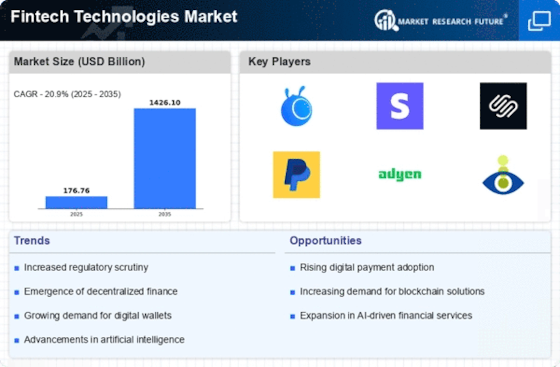Market Analysis
In-depth Analysis of Fintech Technologies Market Industry Landscape
Fintech Technologies' dynamics have evolved in recent years owing to client needs and rapid technology advancement. Both factors interacted to generate this change. Financial technology (or "Fintech") includes a wide variety of cutting-edge technologies that improve and simplify financial services. Digital payments are pushing financial technology.
Decentralized finance (DeFi) has advanced with blockchain technology expanding fast. This financing is a bank alternative. Blockchain powers peer-to-peer transactions, smart contracts, and lending and borrowing in DeFis. Decentralized financial services have strengthened financial technology. This decentralized financial services movement draws consumers and investors. Financial technology developments include the usage of AI and machine learning. These technologies improve customer experiences and financial institution efficiency. Predictive analytics, fraud detection, and customized financial advice achieve this. For instance, robo-advisors may automate investing by studying market fluctuations and making suggestions. This saves time and money. This increases the number of individuals who can access financial planning services.
Financial technology goods and services are heavily influenced by regulation. Governments and regulatory bodies are realizing the need of balancing innovation and financial system stability. One compromise would foster creativity. Privacy and security compliance is continually assessed and maintained as regulatory frameworks adapt to new Fintech models. Partnerships build synergies by using strengths. This is why traditional financial institutions and financial technology companies are partnering more.
Financial data is delicate, thus the Financial Technology business is anxious about cybersecurity. Financial technology companies must have strong cybersecurity procedures since they handle large amounts of sensitive personal and financial data. Therefore, market dynamics are affected by continually evolving cybersecurity technologies and cyberattack prevention strategies.
This financial technology sector emphasizes investor psychology and finance structure. Private equity and venture capital organizations are investing more in financial technology due to its growth and innovation. Investors seek chances because of the promise of enormous rewards and financial industry paradigm shifts. These changes might completely change the game. Financial technology companies must demonstrate scalability, regulatory compliance, and a viable business model to get financing.
Many factors might affect the financial technology business. These include macroeconomic and global economic conditions. Financial solutions that are efficient and cost-effective are in demand during economic downturns. Thus, financial technology firms' services are used more. However, when the economy is strong, individuals and organizations may invest in cutting-edge financial technologies to capitalize on growth. They feel such technologies will help them grow their businesses. This is because they believe such investments would help them achieve their goals.


















Leave a Comment